牛津译林版七年级下Unit 5 Amazing things 语言要点解析课件(共24张PPT)
文档属性
| 名称 | 牛津译林版七年级下Unit 5 Amazing things 语言要点解析课件(共24张PPT) | 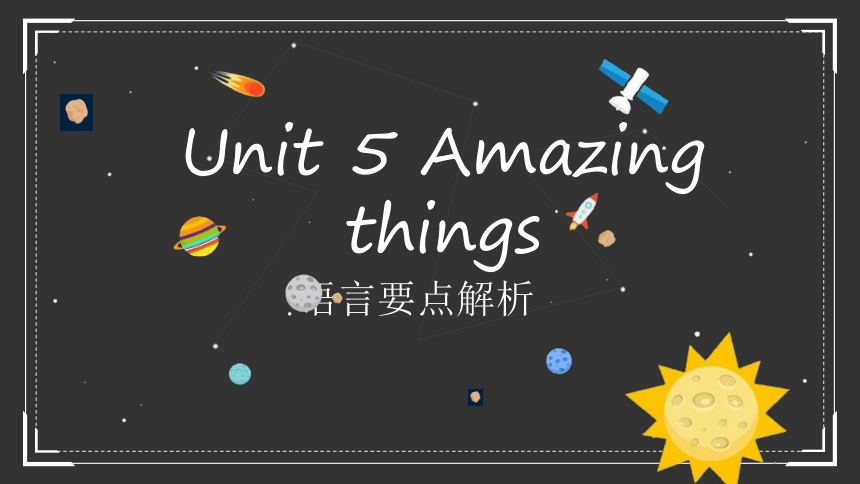 | |
| 格式 | zip | ||
| 文件大小 | 13.8MB | ||
| 资源类型 | 教案 | ||
| 版本资源 | 牛津译林版 | ||
| 科目 | 英语 | ||
| 更新时间 | 2020-06-01 13:36:42 | ||
图片预览

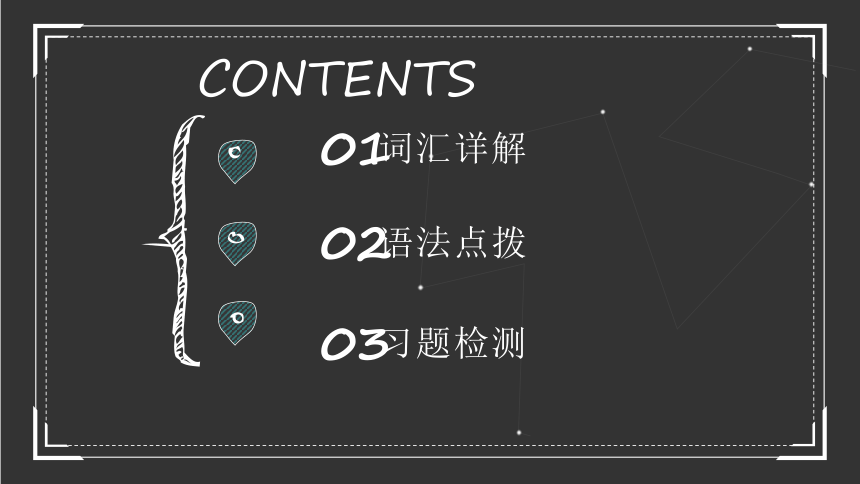
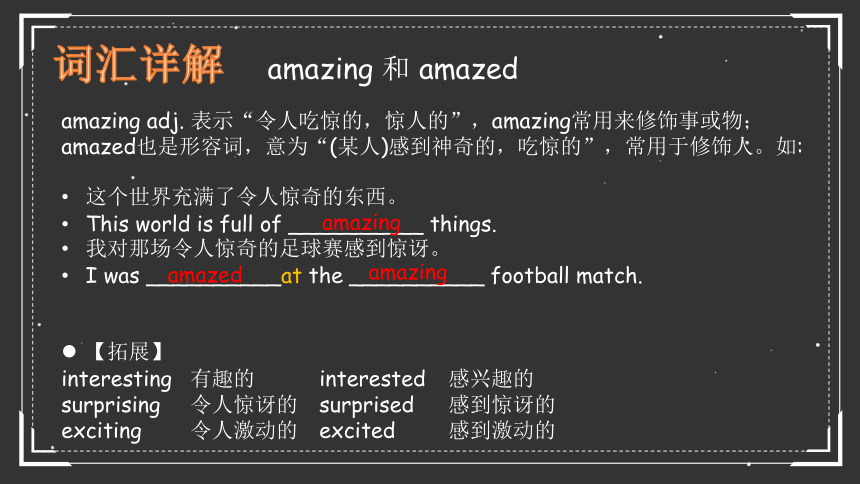
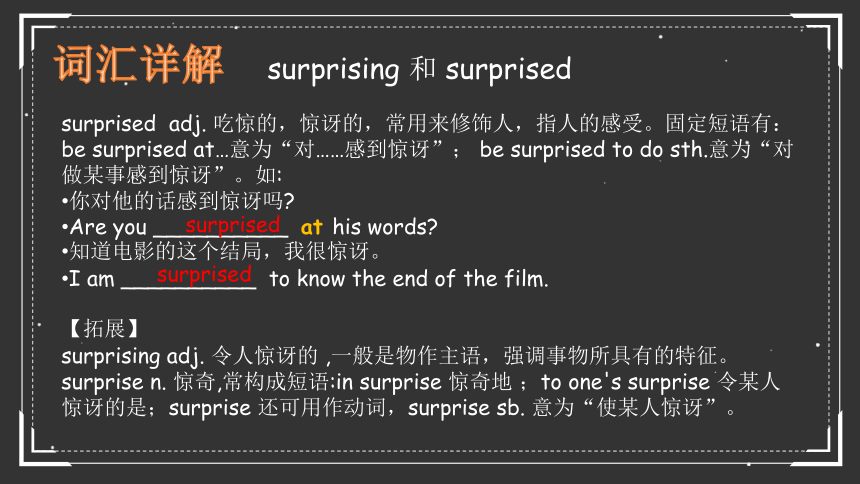
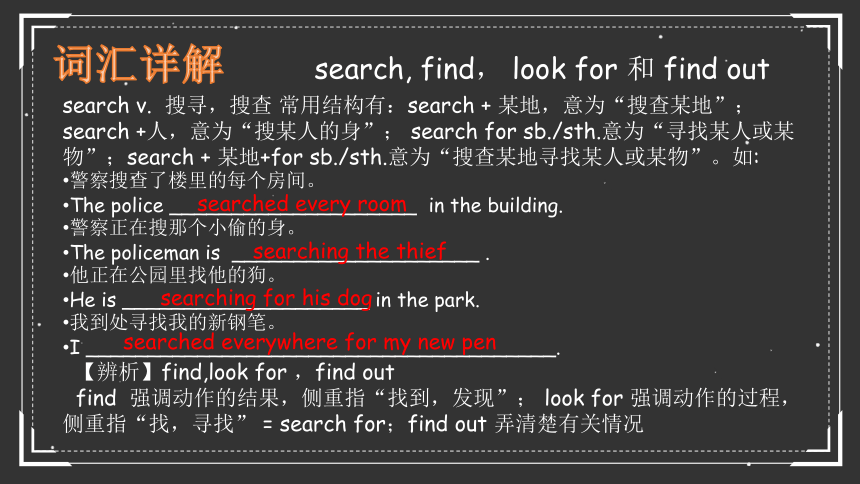
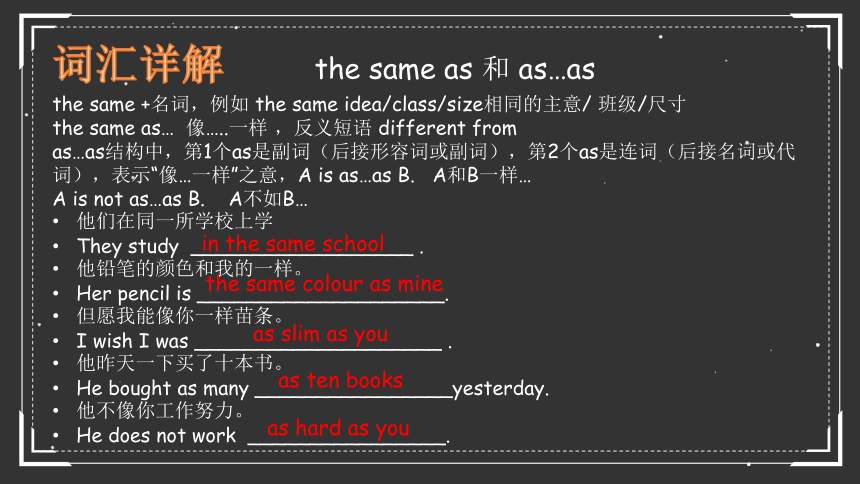
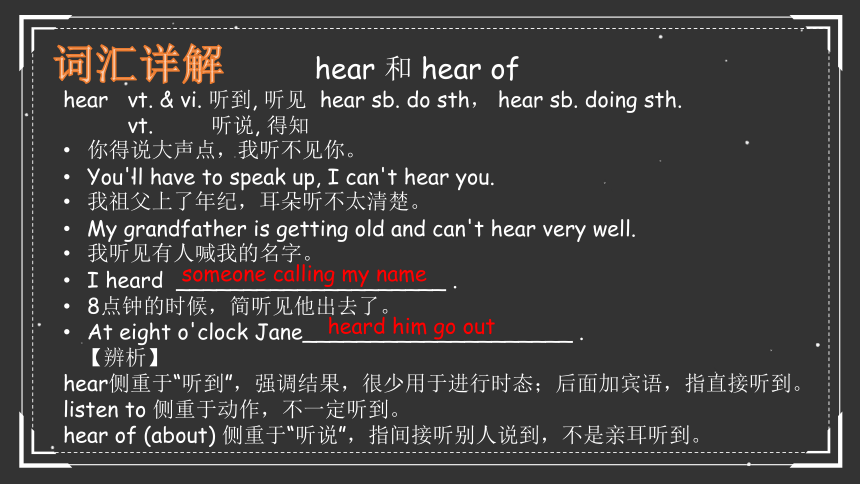
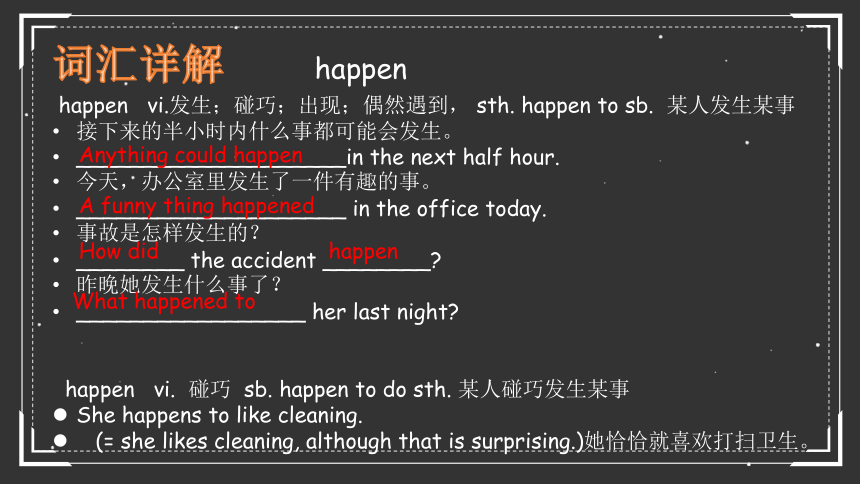
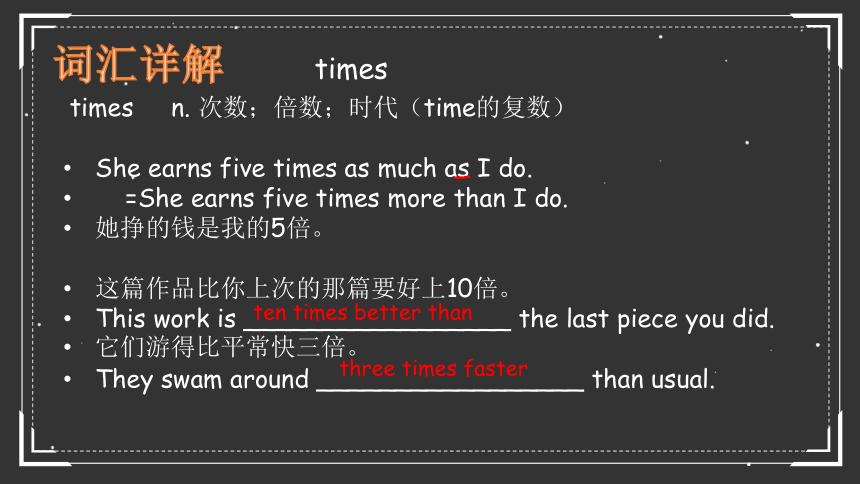
文档简介
(共24张PPT)
Unit
5
Amazing
things
语言要点解析
CONTENTS
amazing
adj.
表示“令人吃惊的,惊人的”,amazing常用来修饰事或物;amazed也是形容词,意为“(某人)感到神奇的,吃惊的”,常用于修饰人。如:
这个世界充满了令人惊奇的东西。
This
world
is
full
of
__________
things.
我对那场令人惊奇的足球赛感到惊讶。
I
was
__________at
the
__________
football
match.
【拓展】
interesting
有趣的
interested
感兴趣的
surprising
令人惊讶的
surprised
感到惊讶的
exciting
令人激动的
excited
感到激动的
amazing
和
amazed
amazing
amazed
amazing
surprised
adj.
吃惊的,惊讶的,常用来修饰人,指人的感受。固定短语有:be
surprised
at…意为“对……感到惊讶”;
be
surprised
to
do
sth.意为“对做某事感到惊讶”。如:
你对他的话感到惊讶吗?
Are
you
__________
at
his
words?
知道电影的这个结局,我很惊讶。
I
am
__________
to
know
the
end
of
the
film.
【拓展】
surprising
adj.
令人惊讶的
,一般是物作主语,强调事物所具有的特征。surprise
n.
惊奇,常构成短语:in
surprise
惊奇地
;to
one's
surprise
令某人惊讶的是;surprise
还可用作动词,surprise
sb.
意为“使某人惊讶”。
surprising
和
surprised
surprised
surprised
search
v.
搜寻,搜查
常用结构有:search
+
某地,意为“搜查某地”;
search
+人,意为“搜某人的身”;
search
for
sb./sth.意为“寻找某人或某物”;search
+
某地+for
sb./sth.意为“搜查某地寻找某人或某物”。如:
警察搜查了楼里的每个房间。
The
police
____________________
in
the
building.
警察正在搜那个小偷的身。
The
policeman
is
____________________
.
他正在公园里找他的狗。
He
is
____________________
in
the
park.
我到处寻找我的新钢笔。
I
______________________________________.
【辨析】find,look
for
,find
out
find
强调动作的结果,侧重指“找到,发现”;
look
for
强调动作的过程,侧重指“找,寻找”
=
search
for;find
out
弄清楚有关情况
search,
find,
look
for
和
find
out
searched
every
room
searching
the
thief
searching
for
his
dog
searched
everywhere
for
my
new
pen
the
same
+名词,例如
the
same
idea/class/size相同的主意/
班级/尺寸
the
same
as…
像…..一样
,反义短语
different
from
as…as结构中,第1个as是副词(后接形容词或副词),第2个as是连词(后接名词或代词),表示“像…一样”之意,A
is
as…as
B.
A和B一样…
A
is
not
as…as
B.
A不如B…
他们在同一所学校上学
They
study
__________________
.
他铅笔的颜色和我的一样。
Her
pencil
is
____________________.
但愿我能像你一样苗条。
I
wish
I
was
____________________
.
他昨天一下买了十本书。
He
bought
as
many
________________yesterday.
他不像你工作努力。
He
does
not
work
________________.
the
same
as
和
as…as
in
the
same
school
the
same
colour
as
mine
as
slim
as
you
as
ten
books
as
hard
as
you
hear
vt.
&
vi.
听到,
听见
hear
sb.
do
sth,
hear
sb.
doing
sth.
vt.
听说,
得知
你得说大声点,我听不见你。
You'll
have
to
speak
up,
I
can't
hear
you.
我祖父上了年纪,耳朵听不太清楚。
My
grandfather
is
getting
old
and
can't
hear
very
well.
我听见有人喊我的名字。
I
heard
____________________
.
8点钟的时候,简听见他出去了。
At
eight
o'clock
Jane____________________
.
【辨析】
hear侧重于“听到”,强调结果,很少用于进行时态;后面加宾语,指直接听到。
listen
to
侧重于动作,不一定听到。
hear
of
(about)
侧重于“听说”,指间接听别人说到,不是亲耳听到。
hear
和
hear
of
someone
calling
my
name
heard
him
go
out
happen
vi.发生;碰巧;出现;偶然遇到,
sth.
happen
to
sb.
某人发生某事
接下来的半小时内什么事都可能会发生。
____________________in
the
next
half
hour.
今天,办公室里发生了一件有趣的事。
____________________
in
the
office
today.
事故是怎样发生的?
________
the
accident
________?
昨晚她发生什么事了?
_________________
her
last
night?
happen
vi.
碰巧
sb.
happen
to
do
sth.
某人碰巧发生某事
She
happens
to
like
cleaning.
(=
she
likes
cleaning,
although
that
is
surprising.)她恰恰就喜欢打扫卫生。
happen
Anything
could
happen
A
funny
thing
happened
How
did
What
happened
to
happen
times
n.
次数;倍数;时代(time的复数)
She
earns
five
times
as
much
as
I
do.
=She
earns
five
times
more
than
I
do.
她挣的钱是我的5倍。
这篇作品比你上次的那篇要好上10倍。
This
work
is
_________________
the
last
piece
you
did.
它们游得比平常快三倍。
They
swam
around
_________________
than
usual.
times
ten
times
better
than
three
times
faster
in
是指以现在为起点的将来一段时间,用于将来时态,
in+时间段
after
用在某个时刻或日期之前,after+时间点,after还可以作连词,后跟句子
later
表示以过去某一段时间之后,用于过去时态,时间段+later。
如:
他一个星期之后回来。
He
will
be
back__________________
.
他两天以后去了美国。
He
went
to
America
_________________
.
我们将在四点钟后到那儿。
We
will
arrive
here
__________________.
老人9月1日病倒了,几天之后就去世了。
The
old
man
fell
ill
on
September
1st
and
died
__________________
.
他吃完早饭干什么?
What
does
he
do
_____________________?
【拓展】
sooner
or
later
迟早,早晚
see
you
later
再见;回头见
later,
after
和
in
in
a
week
two
days
later
after
4
o’clock.
a
few
days
later
after
he
has
breakfast
ago用于过去时,放在“时间段”的之后,表示从现在算起的一段时间之前。
before后接“时间点”,可用于任何时态。before
还可单独作用,常与现在完成时连用(8B将学到了),也可与一般过去时连用。
by
表示不迟于某一时间点
如:
他爷爷10年前去世了。
His
grandfather
died
_______________
.
我们六点钟之前到了学校。
We
got
to
school
__________________
.
我希望你能上午九点之前在这儿。
I
hope
you
can
be
here
__________________.
我以前在上海遇见过他。
I
met
him
in
Shanghai
__________.
到今天早上十点,他已经完成了这项任务。
He
had
finished
the
work
______________________.
ago
,
before
和
by
ten
years
ago
before
six
o’clock
before
9.00
a.m.
before
by
ten
o'clock
this
morning
reply
vi
.
回答,答复,reply
to,回答,答复;
reply
n.
回答,答复,反应,the
reply
to
a
question
问题的回答
,make
no
reply
不作答复。如:
你应该立刻给他回信。
You
should
_________________
at
once.
他很少回复他朋友的电子邮件。
He
seldom
___________________
from
his
friends
.
【辨析】reply
和
answer
answer
是非正式用语,用法更广泛,回答问题、回信、接电话、听见门铃去开门都可用answer。reply为正式用语,多指经过考虑,有针对性的,详细的回答,作不及物动词时,常和介词to连用;作及物动词时,后面接从句或直接引语。如:
I
called
him.
But
no
one
answered
it.
我给他打了电话,但没有人接。
I
sent
in
my
application,
and
the
university
replied
to
me
at
once.
我把申请书寄去,那所大学立即给我答复了。
reply
reply
to
his
letter
replies
to
the
emails
stop
doing
sth.
意为“停止(正在)做的事情”,doing
sth.
在句中是stop的宾语。
stop
to
do
sth.
意为“停止(正在做的事)去做某事”,to
do
sth.
在句中作目的状语。如:
婴儿停止了哭叫,听起了音乐。
The
baby
___________________
and
listened
to
the
music.
停下来喝些咖啡,好吗?
How
about
___________________
some
coffee?
【拓展】
remember
to
do
sth.
意为“记住(要)做某事”,这件事还没有做;
remember
doing
sth.
意为“记得做过某事”,这件事已做过。如:
Remember
to
bring
this
book
next
time.
别忘了下次把这本书带来。
Do
you
remember
to
turn
off
the
light
when
you
leave
?
你记得离开时要关灯吗?
I
remember
seeing
her
once.
我记得见过她一次。
stop
doing
sth.
和
stop
to
do
sth.
stopped
crying
stopping
to
drink
SIMPLE
PAST
TENSE
一般过去时
1.
Daisy
________
(bring)
some
chocolates
to
the
birthday
party.
2.
I________
(hear)
a
new
song
on
the
radio.
3.
Peter________
(read)
three
books
last
week.
4.
The
Smiths
________
(speak)
Italian
to
the
waitress.
5.
Peter
__________
(understand)
during
the
class,
but
now
he
doesn't
understand.
6.
My
mother________
(forget)
to
buy
some
milk.
7.
Susan
________
(have)
a
baby
in
August.
8.
We
________(lose)
our
keys
last
Friday.
9.
They
________
(swim)
500m
yesterday
afternoon.
10.
I
________(give)
my
mother
a
CD
for
her
birthday.
11.
At
the
age
of
23,
she
________
(become)
a
teacher.
12.
I
________
(know)
the
answer
yesterday.
13.
Peter________
(tell)
me
that
he
lived
in
New
York.
14.
We
________
(lend)
John
200
yuan.
15.
She
________
(drink)
too
much
coffee
yesterday.
16.
The
children
________
(sleep)
in
the
car.
17.
He
________
(keep)
his
promise.
18.
We
________
(choose)
the
steak
for
dinner.
19.
The
film
________
(begin)
late.
20.
They________
(fly)
to
Madrid.
21.
We
________
(drive)
to
Edinburgh.
22.
Mrs.
Black
________
(teach)
English
at
the
University.
23.
They
________
(send)
me
an
e-mail
earlier.
24.
We
________
(leave)
at
7
a.m..
1.-What
happened
________
Tom
yesterday
evening?
-He
played
basketball
and
hurt
himself.
A.
at
B.
on
C.
to
D.
about
2.-Reading
is
a
good
way
to
spend
the
time
on
the
plane.
-That's
true.
I
never
go
travelling
________
a
book.
A.
without
B.
from
C.
on
D.
about
3.-Do
you
know
who
took
the
students
to
the
old
people's
home,
Tony?
-Well,Mr
Smith
________
.
A.
took
B.
does
C.
did
D.
do
4.-Why
aren't
you
getting
ready
for
your
coming
trip?
-Don't
worry.
________
is
ready
now.
A.
Something
B.
Everything
C.
Nothing
D.
Any
things
5.
Suddenly
he
heard
someone
________
for
help
from
the
river.
A.
cry
B.
cried
C.
crying
D.
is
crying
6.-Kate,
do
you
know
a
girl
________
Mary?
-Yes,of
course.
She
is
my
classmate.
A.
call
B.
called
C.
calling
D.
calls
7.-Where
is
Daniel?
-I
think
he
must
be
________
home
now.
A.
on
his
way
to
B.
on
his
way
C.
in
his
way
to
D.
in
his
way
8.
You
will
________
the
whisper
of
the
breeze
if
you
________carefully.
A.
hear;
listen
B.
listen;
hear
C.
hear;
listen
to
D.
listen
to;
hear
1.知道我的笔友快速回复了我的信,我很惊讶。
2.那天晚些时候,他在回家路上发生了一些不开心的事情。
3.他昨天晚上为什么不开着灯做作业?
4.了解了这么多动物之后,你再也不用害怕他们了。
5感谢你告诉我两个月前他向你要了至少两盒粉笔。
Thanks
for
telling
me
that
he
asked
you
for
at
least
two
boxes
of
chalk
two
months
ago.
I
was
surprised
to
know
that
my
penfriend
replied
to
my
letter
quickly.
On
his
way
home,
something
unhappy
happened
to
him
later
that
day.
Why
didn't
he
do
his
homework
with
the
light
on
last
night?
You
don't
need
to
be
afraid
of
them
any
more
after
learning
about
so
many
animals.
Complete
the
exercises
Review
key
points
of
Unit
5
THANK
YOU
Unit
5
Amazing
things
语言要点解析
CONTENTS
amazing
adj.
表示“令人吃惊的,惊人的”,amazing常用来修饰事或物;amazed也是形容词,意为“(某人)感到神奇的,吃惊的”,常用于修饰人。如:
这个世界充满了令人惊奇的东西。
This
world
is
full
of
__________
things.
我对那场令人惊奇的足球赛感到惊讶。
I
was
__________at
the
__________
football
match.
【拓展】
interesting
有趣的
interested
感兴趣的
surprising
令人惊讶的
surprised
感到惊讶的
exciting
令人激动的
excited
感到激动的
amazing
和
amazed
amazing
amazed
amazing
surprised
adj.
吃惊的,惊讶的,常用来修饰人,指人的感受。固定短语有:be
surprised
at…意为“对……感到惊讶”;
be
surprised
to
do
sth.意为“对做某事感到惊讶”。如:
你对他的话感到惊讶吗?
Are
you
__________
at
his
words?
知道电影的这个结局,我很惊讶。
I
am
__________
to
know
the
end
of
the
film.
【拓展】
surprising
adj.
令人惊讶的
,一般是物作主语,强调事物所具有的特征。surprise
n.
惊奇,常构成短语:in
surprise
惊奇地
;to
one's
surprise
令某人惊讶的是;surprise
还可用作动词,surprise
sb.
意为“使某人惊讶”。
surprising
和
surprised
surprised
surprised
search
v.
搜寻,搜查
常用结构有:search
+
某地,意为“搜查某地”;
search
+人,意为“搜某人的身”;
search
for
sb./sth.意为“寻找某人或某物”;search
+
某地+for
sb./sth.意为“搜查某地寻找某人或某物”。如:
警察搜查了楼里的每个房间。
The
police
____________________
in
the
building.
警察正在搜那个小偷的身。
The
policeman
is
____________________
.
他正在公园里找他的狗。
He
is
____________________
in
the
park.
我到处寻找我的新钢笔。
I
______________________________________.
【辨析】find,look
for
,find
out
find
强调动作的结果,侧重指“找到,发现”;
look
for
强调动作的过程,侧重指“找,寻找”
=
search
for;find
out
弄清楚有关情况
search,
find,
look
for
和
find
out
searched
every
room
searching
the
thief
searching
for
his
dog
searched
everywhere
for
my
new
pen
the
same
+名词,例如
the
same
idea/class/size相同的主意/
班级/尺寸
the
same
as…
像…..一样
,反义短语
different
from
as…as结构中,第1个as是副词(后接形容词或副词),第2个as是连词(后接名词或代词),表示“像…一样”之意,A
is
as…as
B.
A和B一样…
A
is
not
as…as
B.
A不如B…
他们在同一所学校上学
They
study
__________________
.
他铅笔的颜色和我的一样。
Her
pencil
is
____________________.
但愿我能像你一样苗条。
I
wish
I
was
____________________
.
他昨天一下买了十本书。
He
bought
as
many
________________yesterday.
他不像你工作努力。
He
does
not
work
________________.
the
same
as
和
as…as
in
the
same
school
the
same
colour
as
mine
as
slim
as
you
as
ten
books
as
hard
as
you
hear
vt.
&
vi.
听到,
听见
hear
sb.
do
sth,
hear
sb.
doing
sth.
vt.
听说,
得知
你得说大声点,我听不见你。
You'll
have
to
speak
up,
I
can't
hear
you.
我祖父上了年纪,耳朵听不太清楚。
My
grandfather
is
getting
old
and
can't
hear
very
well.
我听见有人喊我的名字。
I
heard
____________________
.
8点钟的时候,简听见他出去了。
At
eight
o'clock
Jane____________________
.
【辨析】
hear侧重于“听到”,强调结果,很少用于进行时态;后面加宾语,指直接听到。
listen
to
侧重于动作,不一定听到。
hear
of
(about)
侧重于“听说”,指间接听别人说到,不是亲耳听到。
hear
和
hear
of
someone
calling
my
name
heard
him
go
out
happen
vi.发生;碰巧;出现;偶然遇到,
sth.
happen
to
sb.
某人发生某事
接下来的半小时内什么事都可能会发生。
____________________in
the
next
half
hour.
今天,办公室里发生了一件有趣的事。
____________________
in
the
office
today.
事故是怎样发生的?
________
the
accident
________?
昨晚她发生什么事了?
_________________
her
last
night?
happen
vi.
碰巧
sb.
happen
to
do
sth.
某人碰巧发生某事
She
happens
to
like
cleaning.
(=
she
likes
cleaning,
although
that
is
surprising.)她恰恰就喜欢打扫卫生。
happen
Anything
could
happen
A
funny
thing
happened
How
did
What
happened
to
happen
times
n.
次数;倍数;时代(time的复数)
She
earns
five
times
as
much
as
I
do.
=She
earns
five
times
more
than
I
do.
她挣的钱是我的5倍。
这篇作品比你上次的那篇要好上10倍。
This
work
is
_________________
the
last
piece
you
did.
它们游得比平常快三倍。
They
swam
around
_________________
than
usual.
times
ten
times
better
than
three
times
faster
in
是指以现在为起点的将来一段时间,用于将来时态,
in+时间段
after
用在某个时刻或日期之前,after+时间点,after还可以作连词,后跟句子
later
表示以过去某一段时间之后,用于过去时态,时间段+later。
如:
他一个星期之后回来。
He
will
be
back__________________
.
他两天以后去了美国。
He
went
to
America
_________________
.
我们将在四点钟后到那儿。
We
will
arrive
here
__________________.
老人9月1日病倒了,几天之后就去世了。
The
old
man
fell
ill
on
September
1st
and
died
__________________
.
他吃完早饭干什么?
What
does
he
do
_____________________?
【拓展】
sooner
or
later
迟早,早晚
see
you
later
再见;回头见
later,
after
和
in
in
a
week
two
days
later
after
4
o’clock.
a
few
days
later
after
he
has
breakfast
ago用于过去时,放在“时间段”的之后,表示从现在算起的一段时间之前。
before后接“时间点”,可用于任何时态。before
还可单独作用,常与现在完成时连用(8B将学到了),也可与一般过去时连用。
by
表示不迟于某一时间点
如:
他爷爷10年前去世了。
His
grandfather
died
_______________
.
我们六点钟之前到了学校。
We
got
to
school
__________________
.
我希望你能上午九点之前在这儿。
I
hope
you
can
be
here
__________________.
我以前在上海遇见过他。
I
met
him
in
Shanghai
__________.
到今天早上十点,他已经完成了这项任务。
He
had
finished
the
work
______________________.
ago
,
before
和
by
ten
years
ago
before
six
o’clock
before
9.00
a.m.
before
by
ten
o'clock
this
morning
reply
vi
.
回答,答复,reply
to,回答,答复;
reply
n.
回答,答复,反应,the
reply
to
a
question
问题的回答
,make
no
reply
不作答复。如:
你应该立刻给他回信。
You
should
_________________
at
once.
他很少回复他朋友的电子邮件。
He
seldom
___________________
from
his
friends
.
【辨析】reply
和
answer
answer
是非正式用语,用法更广泛,回答问题、回信、接电话、听见门铃去开门都可用answer。reply为正式用语,多指经过考虑,有针对性的,详细的回答,作不及物动词时,常和介词to连用;作及物动词时,后面接从句或直接引语。如:
I
called
him.
But
no
one
answered
it.
我给他打了电话,但没有人接。
I
sent
in
my
application,
and
the
university
replied
to
me
at
once.
我把申请书寄去,那所大学立即给我答复了。
reply
reply
to
his
letter
replies
to
the
emails
stop
doing
sth.
意为“停止(正在)做的事情”,doing
sth.
在句中是stop的宾语。
stop
to
do
sth.
意为“停止(正在做的事)去做某事”,to
do
sth.
在句中作目的状语。如:
婴儿停止了哭叫,听起了音乐。
The
baby
___________________
and
listened
to
the
music.
停下来喝些咖啡,好吗?
How
about
___________________
some
coffee?
【拓展】
remember
to
do
sth.
意为“记住(要)做某事”,这件事还没有做;
remember
doing
sth.
意为“记得做过某事”,这件事已做过。如:
Remember
to
bring
this
book
next
time.
别忘了下次把这本书带来。
Do
you
remember
to
turn
off
the
light
when
you
leave
?
你记得离开时要关灯吗?
I
remember
seeing
her
once.
我记得见过她一次。
stop
doing
sth.
和
stop
to
do
sth.
stopped
crying
stopping
to
drink
SIMPLE
PAST
TENSE
一般过去时
1.
Daisy
________
(bring)
some
chocolates
to
the
birthday
party.
2.
I________
(hear)
a
new
song
on
the
radio.
3.
Peter________
(read)
three
books
last
week.
4.
The
Smiths
________
(speak)
Italian
to
the
waitress.
5.
Peter
__________
(understand)
during
the
class,
but
now
he
doesn't
understand.
6.
My
mother________
(forget)
to
buy
some
milk.
7.
Susan
________
(have)
a
baby
in
August.
8.
We
________(lose)
our
keys
last
Friday.
9.
They
________
(swim)
500m
yesterday
afternoon.
10.
I
________(give)
my
mother
a
CD
for
her
birthday.
11.
At
the
age
of
23,
she
________
(become)
a
teacher.
12.
I
________
(know)
the
answer
yesterday.
13.
Peter________
(tell)
me
that
he
lived
in
New
York.
14.
We
________
(lend)
John
200
yuan.
15.
She
________
(drink)
too
much
coffee
yesterday.
16.
The
children
________
(sleep)
in
the
car.
17.
He
________
(keep)
his
promise.
18.
We
________
(choose)
the
steak
for
dinner.
19.
The
film
________
(begin)
late.
20.
They________
(fly)
to
Madrid.
21.
We
________
(drive)
to
Edinburgh.
22.
Mrs.
Black
________
(teach)
English
at
the
University.
23.
They
________
(send)
me
an
earlier.
24.
We
________
(leave)
at
7
a.m..
1.-What
happened
________
Tom
yesterday
evening?
-He
played
basketball
and
hurt
himself.
A.
at
B.
on
C.
to
D.
about
2.-Reading
is
a
good
way
to
spend
the
time
on
the
plane.
-That's
true.
I
never
go
travelling
________
a
book.
A.
without
B.
from
C.
on
D.
about
3.-Do
you
know
who
took
the
students
to
the
old
people's
home,
Tony?
-Well,Mr
Smith
________
.
A.
took
B.
does
C.
did
D.
do
4.-Why
aren't
you
getting
ready
for
your
coming
trip?
-Don't
worry.
________
is
ready
now.
A.
Something
B.
Everything
C.
Nothing
D.
Any
things
5.
Suddenly
he
heard
someone
________
for
help
from
the
river.
A.
cry
B.
cried
C.
crying
D.
is
crying
6.-Kate,
do
you
know
a
girl
________
Mary?
-Yes,of
course.
She
is
my
classmate.
A.
call
B.
called
C.
calling
D.
calls
7.-Where
is
Daniel?
-I
think
he
must
be
________
home
now.
A.
on
his
way
to
B.
on
his
way
C.
in
his
way
to
D.
in
his
way
8.
You
will
________
the
whisper
of
the
breeze
if
you
________carefully.
A.
hear;
listen
B.
listen;
hear
C.
hear;
listen
to
D.
listen
to;
hear
1.知道我的笔友快速回复了我的信,我很惊讶。
2.那天晚些时候,他在回家路上发生了一些不开心的事情。
3.他昨天晚上为什么不开着灯做作业?
4.了解了这么多动物之后,你再也不用害怕他们了。
5感谢你告诉我两个月前他向你要了至少两盒粉笔。
Thanks
for
telling
me
that
he
asked
you
for
at
least
two
boxes
of
chalk
two
months
ago.
I
was
surprised
to
know
that
my
penfriend
replied
to
my
letter
quickly.
On
his
way
home,
something
unhappy
happened
to
him
later
that
day.
Why
didn't
he
do
his
homework
with
the
light
on
last
night?
You
don't
need
to
be
afraid
of
them
any
more
after
learning
about
so
many
animals.
Complete
the
exercises
Review
key
points
of
Unit
5
THANK
YOU
